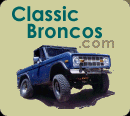Oh, and about that "it's not bad until it has play and spins freely" thing. It's just wrong.
It might be "by the book" but does not always follow the real world.
Just like failed, or failing u-joints. Each one can give you a different clue. Vibrations, noise, excess play, leaking, or in some cases, no clue at all.
Even modern unit-type wheel bearings can fail and not give you the normally expected clues. I've had four worn out unit bearings on different cars, and all four had different symptoms. With only one having excessive play.
And of course, I was sure that was the one making all the noise. It wasn't...
The others made noise and one even leaked. The loose one was dead quiet.
My '71's large bearing was not as easy to turn as yours, and did not make noise when rotating. But when I was doing the brakes I tested it for play, found more than I liked and could hear a dry chunky sound when I wobbled it up and down.
Replaced them both and found my Bronco rolled noticeably easier on the road. Turns out they were adding rolling resistance and I didn't even know it.
A friend's Super Duty lost it's unit bearing on a trip to BC last year, and he only knew it when the truck started to slow down unexpectedly. When he got out to see what was up, the one side was just smoldering and about to light up the truck!
Oh, and I've probably known of at least 15 Early Broncos that lost a wheel and an axle due to original rear wheel bearings having been left in too long. A couple of them here on the forums.
Hence me looking at replacing them as "cheap insurance" these days.
Especially if this Bronco is new to you, and you don't know the history of it and can't find out from the PO.
Paul










